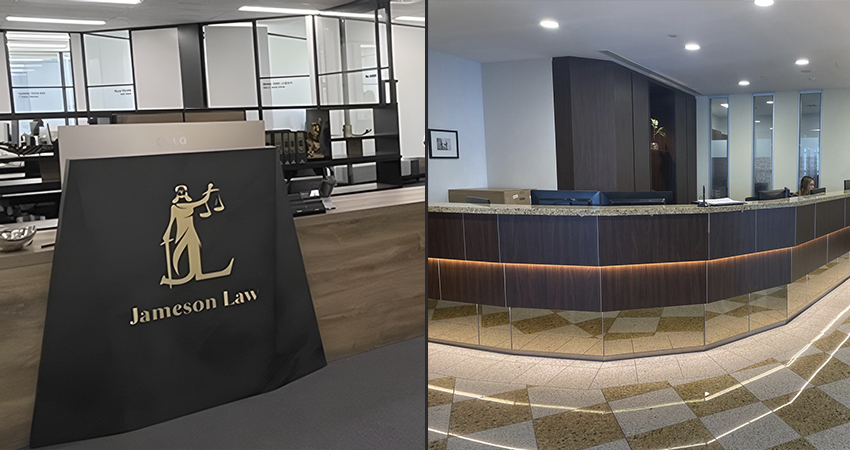BOOK YOUR CONSULTATION
This form submission is encrypted and secure.

Commercial
Lawyer
Lawyer

Back to back winners of the most prestigious Local Business Awards and multiple criminal defence category awards.


Commercial
Lawyer
Lawyer

Back to back winners of the most prestigious Local Business Awards and multiple criminal defence category awards.

Our experienced commercial lawyers will utilise the full extent of the law to ensure success.
Award-Winning
Law Firm
We have won several client service excellence and leading law firm awards every year up to and including 2025.
Proven Track Record
50+ Years of Combined Experience litigating commercial matters means a successful outcome is on the table.
5 Star Reviews Everywhere
We’re in it to win it and we fight hard for our clients. That’s why anywhere you look you will find 5 star reviews.
Book a Consultation Today
If your case is important to you it’s important to us. Call Jameson Law and join the winning side today.
Award-Winning
Law Firm
We have won several client service excellence and leading law firm awards every year up to and including 2025.
Proven Track
Record
50+ Years of Combined Experience litigating commercial matters means a successful outcome is on the table.
5 Star Reviews
Everywhere
We’re in it to win it and we fight hard for our clients. That’s why anywhere you look you will find 5 star reviews.
Book a
Consultation Today
If your case is important to you it’s important to us. Call Jameson Law and join the winning side today.
At Jameson Law, we understand business. Our commercial law team’s perspective and strategy for business, corporate and commercial matters are based on years of experience establishing and being in business across multiple industries and sectors. We understand the struggles involved, and what constitutes a win for the business, and research and apply the law to this end, achieving real and tangible outcomes for our clients.
Assisting Small to Medium Business, Startups and Corporates
Our business and commercial law team provides a full array of commercial services to Australian companies from start-ups to corporates. We provide a range of legal assistance with fixed fees. This gives more transparency in fees than typical law firms charging hourly.
Speak to a lawyer today
If you are looking for dedicated commercial lawyers who are experienced in a variety of commercial law to help protect your business, contact our legal practice today for a consultation and further information on how we can assist you get the best from your business.


Our Expertise in Commercial Law:
Our expert commercial lawyers specialise in a range of commercial law matters, including:
![]() Business Transactions including Buying a business and Selling a business
Business Transactions including Buying a business and Selling a business
![]() Intellectual property (contracts and disputes)
Intellectual property (contracts and disputes)
![]() Corporate law, including corporate governance
Corporate law, including corporate governance
![]() Sale of goods and consumer law/trade practices
Sale of goods and consumer law/trade practices
![]() Business law
Business law
![]() Contract law
Contract law
![]() Commercial litigation and dispute resolution
Commercial litigation and dispute resolution
![]() Employment law
Employment law
![]() Property law
Property law
![]() Personal Property Securities
Personal Property Securities
![]() Unit Trusts
Unit Trusts
![]() Business Contracts and Negotiation
Business Contracts and Negotiation
![]() Dispute Resolution and Litigation
Dispute Resolution and Litigation
![]() Bankruptcy and Insolvency Guidance
Bankruptcy and Insolvency Guidance
![]() Mergers and Acquisitions
Mergers and Acquisitions
![]() Intellectual Property Protection
Intellectual Property Protection
We deliver practical, strategic advice to ensure your business remains compliant, efficient, and financially healthy.
Intellectual Property (IP)
Protecting your intangible property and assets is becoming more important than ever. Advances in technology mean more IP is created, and more IP infringements and disputes occur. Our Sydney based commercial law firm covers disputes, infringement, contracts, and of course protection for the following intellectual property:
![]() trademarks,
trademarks,
![]() patents,
patents,
![]() copyright,
copyright,
![]() designs,
designs,
![]() trade secrets
trade secrets
![]() know-hows
know-hows
![]() domain names
domain names
![]() brand names
brand names
![]() confidential and scientific information
confidential and scientific information
If you require further information on domestic and international IP laws you may find the following links useful:
![]() World Intellectual Property Organisation
World Intellectual Property Organisation
Buying and Selling a Business
Sale of Shares or Sale of Business?
When selling or purchasing a business, it is imperative to understand exactly what it is that you are purchasing/selling. Before you think of tangible and non-tangible asset inclusions, it is critical to look at the ownership structure. In fact, some tightly regulated industries/business types such as NDIS providers cannot be sold as a “sale of business”, but rather a sale of shares – passing the liabilities and obligations of the previous owner on to the new owner. So what’s the difference?
The law recognises a company as a separate legal entity from its shareholders. Therefore a sale of shares transaction involves taking over the company in its entirety, including all associated risks, liabilities, obligations, and claims. Therefore a sale of share transaction should involve a much more exhaustive due diligence, and a seller can expect to be requested to provide robust warranties and indemnities by the buyer.
A sale of business on the other hand usually includes the sale of selected tangible and intangible including material, equipment, plants, know-how, client lists, business name, goodwill, and other intellectual property. Further, unlike share sale transactions, the buyer does not take on the liabilities of the business.
Sale of Business Contract
Our expert business lawyers have experience acting for both the seller of a business and buyer of a business. If you are a buyer our solicitors will review and advise on the sale of business contract, and provide a thorough listing of the assets both intangible and tangible as well as the obligations and liabilities that are being passed on to you through the sale. Often, key contracts (such as supplier contracts governing critical supply arrangements and agency agreements), key staff, and imperative intellectual property (such as the website, copyright on documentation, and client database) are missed.
If you are a seller, our team will assist with the compilation of a sale of business contract and ensure your liabilities and warranties are at a minimum.
Contract Law and Business Agreements
Our contract lawyers can assist you in the compilation or review of key contracts including:
![]() Partnership Agreements
Partnership Agreements
![]() Franchise Agreements
Franchise Agreements
![]() Shareholder Agreements
Shareholder Agreements
![]() Employee share allocation schemes
Employee share allocation schemes
![]() Supplier contracts
Supplier contracts
![]() Subcontracting and contractor agreements
Subcontracting and contractor agreements
![]() Building Contracts
Building Contracts
![]() Commercial Leases
Commercial Leases
![]() Retail Leases
Retail Leases
![]() Service Agreements
Service Agreements
![]() Confidentiality Agreements
Confidentiality Agreements
![]() Non-disclosure Agreements
Non-disclosure Agreements
![]() Trade restrictions and non-complete clauses
Trade restrictions and non-complete clauses
![]() Employment Agreements
Employment Agreements
Compliance, and Corporate Governance
The Corporations Act 2001 (Cth) can be a minefield to navigate let alone understanding the obligations and duties of your organisation towards stakeholders, employees, suppliers, customers, clients, and regulators such as the Australian Securities and Investments Commission (ASIC). Ensuring your company is complying with its obligations under the Corporations Act and regulators such as ASIC can be a difficult and exhaustive task.
Company Directors are responsible for ensuring their company whether private or public-listed complies with its obligations under the Corporations Act, and adheres to best practice corporate governance. This includes key responsibilities such as:
![]() making decisions for a proper purpose and in the best interests of the company
making decisions for a proper purpose and in the best interests of the company
![]() assessing how decisions will affect the company’s business performance, especially where the company’s money is involved and/or there is a material impact on the company’s reputation
assessing how decisions will affect the company’s business performance, especially where the company’s money is involved and/or there is a material impact on the company’s reputation
![]() staying informed about the financial position of the company to ensure it can pay its debts on time
staying informed about the financial position of the company to ensure it can pay its debts on time
![]() seeking professional advice when assistance is required to make informed decisions
seeking professional advice when assistance is required to make informed decisions
![]() making full and frank disclosure about any material personal interests
making full and frank disclosure about any material personal interests
![]() ensuring the company is not trading while insolvent. This is actually illegal and may be in breach of civil and criminal provisions of the Corporations Act 2001.
ensuring the company is not trading while insolvent. This is actually illegal and may be in breach of civil and criminal provisions of the Corporations Act 2001.
A director’s duties and obligations may continue even after a company has ceased trading and has been deregistered. In certain events, you can be held personally liable where:
![]() you have breached your duties, causing the company to suffer some loss
you have breached your duties, causing the company to suffer some loss
![]() outstanding tax obligations of the company under the ATO’s Director Penalty Regime, particularly in circumstances where the company has employees. As a director, you have a legal responsibility to ensure your company meets its Pay As You Go (PAYG) withholding and Superannuation Guarantee Charge (SGC) obligations.
outstanding tax obligations of the company under the ATO’s Director Penalty Regime, particularly in circumstances where the company has employees. As a director, you have a legal responsibility to ensure your company meets its Pay As You Go (PAYG) withholding and Superannuation Guarantee Charge (SGC) obligations.
![]() running illegal phoenix activity where an existing company has been deliberately wound up or closed down to avoid paying outstanding debts, including taxes, creditors, and employee entitlements.
running illegal phoenix activity where an existing company has been deliberately wound up or closed down to avoid paying outstanding debts, including taxes, creditors, and employee entitlements.
Bankruptcy and Insolvency Law Services
Businesses facing financial difficulties can benefit from our expert advice on bankruptcy and insolvency. Our commercial lawyers help businesses navigate the complexities of insolvency laws, including:
![]() Corporate insolvency processes
Corporate insolvency processes
![]() Personal guarantees and bankruptcy proceedings
Personal guarantees and bankruptcy proceedings
![]() Creditors’ rights and debt recovery
Creditors’ rights and debt recovery
![]() Options for restructuring and avoiding liquidation
Options for restructuring and avoiding liquidation
We work closely with clients to protect assets, negotiate with creditors, and explore options for restructuring or winding up a business. If you’re struggling with insolvency, our team can provide the legal support you need to make informed decisions.
Industry-specific legal expertise:
![]() Our commercial law team has extensive experience dealing with the following industry-specific areas:
Our commercial law team has extensive experience dealing with the following industry-specific areas:
![]() Construction and Home Building including building contracts, Fair Trading licensing appeals, Fair Trading disputes, Fair Trading internal reviews, and Complaints Resolution.
Construction and Home Building including building contracts, Fair Trading licensing appeals, Fair Trading disputes, Fair Trading internal reviews, and Complaints Resolution.
![]() Liquor Licensing
Liquor Licensing
![]() Registered Training Organisations including CRICOS and domestic compliance, Non-compliance, and de-registration Australian Skills Quality Authority appeals and litigation.
Registered Training Organisations including CRICOS and domestic compliance, Non-compliance, and de-registration Australian Skills Quality Authority appeals and litigation.
![]() National Disability Insurance Scheme (NDIS) provider deregistration and non-compliance litigation, National Disability Insurance Agency (NDIA) appeals; as well as company setup service provider sale and purchase of shares
National Disability Insurance Scheme (NDIS) provider deregistration and non-compliance litigation, National Disability Insurance Agency (NDIA) appeals; as well as company setup service provider sale and purchase of shares
![]() Pharmacy purchase and sales; dispute resolution, licence appeals and litigation
Pharmacy purchase and sales; dispute resolution, licence appeals and litigation
![]() Medical Cannabis Therapeutic Goods Administration (TGA) appeals and compliance
Medical Cannabis Therapeutic Goods Administration (TGA) appeals and compliance
![]() Corporate Law
Corporate Law
![]() Fashion Lawyer
Fashion Lawyer
Australian businesses are regulated by the Australian Securities and Investment Commission which in turn is governed by the Corporate Law Act (Cth) 2001 (simplified through the Corporate Law Economic Reform Program Act 2004). The act also sets out the laws governing the form and function of a company. Further regulations for certain industries also apply to businesses and codes of practice and in some cases specific licensing, memberships, registrations, and accreditations must be upheld and implemented in such businesses. Examples of these are the Financial Sector regulated by APRA, Registered Training Organisations (RTOs) regulated by the Australian Skills Quality Authority (ASQA), and NDIS Quality and Safeguards Commission regulating NDIS providers.
In a nutshell...
Choosing the right commercial lawyer can make all the difference to your business’s success and financial stability. At Jameson Law, we combine legal expertise with a deep understanding of business challenges. We offer Proven experience across various industries, expertise in bankruptcy and insolvency, tailored solutions for every business size and structure and dedicated and proactive service from start to finish.

Speak to a lawyer today
If you are looking for dedicated commercial team with lawyers who are experienced in a variety of commercial law to help protect your business, contact our legal practice today for a consultation and further information on how we can assist you get the best from your business.
Disclaimer
The above is general legal information and should not be considered legal advice. You should speak with one of our commercial lawyers for legal advice tailored to your specific legal matter. The courts and tribunals deal with matters on a case by case basis.
Speak to an Expert Lawyer today

WE'RE IN IT TO WIN IT
Book your consultation
- This form submission is encrypted and secured to ensure your information remains confidential.
This form submission is encrypted and secured to ensure your information remains confidential.
What our Clients Say
Experienced Commercial Lawyer Services

FAQs
Frequently Asked Questions.
What is commercial law?
What does Commercial Law involve?
Commercial law is related to both business law and corporate law, however, it is broader than both. Commercial law involves lawyers who understand laws and provide legal advice on all aspects of commercial transactions (such as contract law, property law, tax law, employment law, corporate governance and consumer law), as well as represent individuals and businesses in dispute resolution and commercial litigation.
In Australia, commercial law is an area that is highly regulated, so often also involves dealing with State and Federal government agencies. This means that often, commercial law involves aspects of public law such as administrative law, regulation (whether securities and investments, competition, prudential regulation, or foreign investment).
Is commercial law a difficult area of law?
Is commercial law well paid?
What are the types of commercial law?
What do commercial lawyers do?
A commercial lawyer will carry out a range of tasks, but will generally practice in one of two main areas:
Corporate law and advice/transactions work; or
Commercial litigation and dispute resolution.
Transactional lawyers advise clients on a range of matters such as tax, sale of goods or consumer law, employment law contracts, and intellectual property protection, as well as aspects of corporate law. Often, a commercial lawyer will specialise in one or a few of these areas, as each can be complex.
Litigation lawyers, on the other hand, focus on disputes which arise in a commercial setting. These lawyers will generally advise clients on dispute resolution, and represent those clients in negotiations, mediation or arbitration, or in Court. Given these lawyers generally specialise in skills such as negotiation and in Court procedures, commercial litigation lawyers can often practice more broadly than those who focus on transactions.
How do you become a commercial lawyer?
Many students who enrol in a university law school will choose coursework subjects in their degree which focus on commercial law, with a view to learning about various types of commercial law and how they operate in practice.
Many students will also complete internships (or clerkships) at a legal practice during their student enrolment in order to gain practical experience, as the study of law can be quite different to practice and law firms typically value this kind of initiative and experience when hiring junior lawyers.
Once a person is qualified as a lawyer, they might choose to undertake further study options with a greater focus on an area of commercial law of interest, such as a postgraduate master of law in commercial law.
Once a person is qualified as a lawyer and has a demonstrated interest in commercial law, this will generally qualify them to seek employment as a commercial lawyer.
Experienced Commercial Lawyer – Proven Success in Business Cases
WE'RE IN IT TO WIN IT
Book your consultation
- This form submission is encrypted and secured to ensure your information remains confidential.
This form submission is encrypted and secured to ensure your information remains confidential.
OUR SYDNEY OFFICES
Parramatta CBD - Head Office
- (02) 8806 0866
- 0488 817 882
- 02 9052 0840
- info@jamesonlaw.com.au
- Suite 301, 67-69 Philip St Parramatta NSW 2150
Sydney CBD - Practice Office
- 02-8806-0866
- 0488 817 882
- 02 9052 0840
- info@jamesonlaw.com.au
- Tower One Barangaroo International Towers Level 35, 100 Barangaroo Ave Sydney NSW 2000
Blacktown CBD - Practice Office
- (02) 8806 0866
- 0488 817 882
- 02 9052 0840
- info@jamesonlaw.com.au
-
Level 3 81 Flushcombe Road, Blacktown NSW 2148
(By Appointment Only)

Liverpool CBD - Practice Office
- (02) 8806 0866
- 0488 817 882
- 02 9052 0840
- info@jamesonlaw.com.au
-
Level 2, 215-219 George Street, Liverpool NSW 2170
(By Appointment Only)

Bankstown CBD - Practice Office
- (02) 8806 0866
- 0488 817 882
- 02 9052 0840
- info@jamesonlaw.com.au
-
23 Restwell Street, Bankstown NSW 2200
(By Appointment Only)



Court Houses We Frequent
Local Courts
Balmain Local Court
- 1300 679 272
- local-court-burwood@justice.nsw.gov.au
- 368 Darling Street, Balmain NSW 2041
Registry: Monday to Friday, 9:00am to 4:30pm
Bankstown Local Court
- 1300 679 272
- (02) 9722 6060
- PO Box 71 BANKSTOWN NSW 2200
- local-court-bankstown@justice.nsw.gov.au
- Cnr Chapel Road and The Mall BANKSTOWN NSW 2200
Court Operating Hours: 9:30am-4:30pm
Blacktown Local Court
- 1300 679 272
- (02) 9672 2666
- PO Box 217 BLACKTOWN NSW 2148
- local-court-blacktown@justice.nsw.gov.au
- 1 Kildare Road Blacktown NSW 2148
Registry Hours: 9:00 – 4:30
Telephone Hours: 8:30 -4:30
Days open: Mon-Fri
Burwood Local Court
- 1300 679 272
- (02) 9744 4144
- PO Box 235 BURWOOD NSW 1805
- local-court-burwood@justice.nsw.gov.au
- 7-9 Belmore Street BURWOOD NSW 2134
Registry Hours: 9:00 – 4:30
Telephone Hours: 8:30 – 4:30
Days open: Mon – Fri
Campbell Local Court
- 1300 679 272
- (02) 9821 7888
- PO Box 3435 LIVERPOOL WESTFIELDS NSW 2170
- local-court-campbelltown@justice.nsw.gov.au
- 150 George Street LIVERPOOL NSW 2170
Registry Hours: 9:00 – 4:30
Telephone Hours: 8:30 – 4:30
Days open: Mon – Fri
Central Local Court
- 1300 679 272
- (02) 4223 3633
- PO Box 5395 WOLLONGONG NSW 2500
- local-court-wollongong@justice.nsw.gov.au
- Cnr Market and Church Streets WOLLONGONG NSW 2500
Registry Hours: 9:00 – 1:00 and 2:00 – 4:30
Telephone Hours: 8:30 – 4:30
Downing Local Court
- 1300 679 272
- (02) 4223 3633
- PO Box 5395 WOLLONGONG NSW 2500
- dclc@justice.nsw.gov.au
- 143-147 Liverpool Street, Sydney NSW 2000
- Nearest Train Station: Museum Station (Liverpool Street entrance is directly opposite)
- Levels: Local Court matters are heard on levels 4 and 5.
- Public Transport: Well-served by buses and trains, with easy access to nearby bus stops and Museum Station.
- Parking: Limited street parking is available, and there are several public parking garages nearby.
Registry Hours: 9:00 – 1:00 and 2:00 – 4:30
Telephone Hours: 8:30 – 4:30
Wollongong Local Court
- 1300 679 272
- (02) 4223 3633
- PO Box 5395 WOLLONGONG NSW 2500
- local-court-wollongong@justice.nsw.gov.au
- Cnr Market and Church Streets WOLLONGONG NSW 2500
Registry Hours: 9:00 – 1:00 and 2:00 – 4:30
Telephone Hours: 8:30 – 4:30
Fairfield Local Court
- 1300 679 272
- (02) 4223 3633
- PO Box 5395 WOLLONGONG NSW 2500
- local-court-wollongong@justice.nsw.gov.au
- Cnr Spencer St & Court Rd, Fairfield NSW 2165
Registry Hours: 9:00 – 1:00 and 2:00 – 4:30
Telephone Hours: 8:30 – 4:30
Hornsby Local Court
- 1300 679 272
- (02) 9847 9955
- PO Box 96 HORNSBY NSW 1630
- local-court-hornsby@justice.nsw.gov.au
- 294 Peats Ferry Rd HORNSBY NSW 2077
Registry Hours: 9:00 – 1:00 and 2:00 – 4:30
Telephone Hours: 8:30 – 4:30
Liverpool Local Court
- 1300 679 272
- (02) 9722 6060
- PO Box 71 BANKSTOWN NSW 2200
- local-court-bankstown@justice.nsw.gov.au
- Cnr Chapel Road and The Mall BANKSTOWN NSW 2200
Registry Hours: 9:00 – 1:00 and 2:00 – 4:30
Telephone Hours: 8:30 – 4:30
Manly Local Court
- 1300 679 272
- (02) 9722 6060
- PO Box 71 BANKSTOWN NSW 2200
- local-court-bankstown@justice.nsw.gov.au
- Cnr Chapel Road and The Mall BANKSTOWN NSW 2200
Registry Hours: 9:00 – 1:00 and 2:00 – 4:30
Telephone Hours: 8:30 – 4:30
Newtown Local Court
- 1300 679 272
- (02) 9722 6060
- PO Box 71 BANKSTOWN NSW 2200
- local-court-bankstown@justice.nsw.gov.au
- Cnr Chapel Road and The Mall BANKSTOWN NSW 2200
Registry Hours: 9:00 – 1:00 and 2:00 – 4:30
Telephone Hours: 8:30 – 4:30
Parramatta Local Court
- 1300 679 272
- (02) 4223 3633
- PO Box 92 Parramatta NSW 2150, Australia
- local-court-parramatta@justice.nsw.gov.au
- 12 George Street Parramatta NSW 2150, Australia
Registry Hours: 9:00 – 1:00 and 2:00 – 4:30
Telephone Hours: 8:30 – 4:30
Penrith Local Court
- 1300 679 272
- (02) 9722 6060
- PO Box 71 BANKSTOWN NSW 2200
- local-court-bankstown@justice.nsw.gov.au
- Cnr Chapel Road and The Mall BANKSTOWN NSW 2200
Registry Hours: 9:00 – 1:00 and 2:00 – 4:30
Telephone Hours: 8:30 – 4:30
Sutherland Local Court
- 1300 679 272
- PO Box 37, Sutherland 2232
- local-court-sutherland@justice.nsw.gov.au
- Cnr Flora and Belmont Street, Sutherland NSW 2232
Registry Hours: 9:00 – 1:00 and 2:00 – 4:30
Telephone Hours: 8:30 – 4:30
Waverley Local Court
- 1300 679 272
- (02) 9722 6060
- PO Box 71 BANKSTOWN NSW 2200
- local-court-bankstown@justice.nsw.gov.au
- Cnr Chapel Road and The Mall BANKSTOWN NSW 2200
Registry Hours: 9:00 – 1:00 and 2:00 – 4:30
Telephone Hours: 8:30 – 4:30
Windsor Local Court
- 1300 679 272
- (02) 9722 6060
- PO Box 71 BANKSTOWN NSW 2200
- local-court-bankstown@justice.nsw.gov.au
- Cnr Chapel Road and The Mall BANKSTOWN NSW 2200
Registry Hours: 9:00 – 1:00 and 2:00 – 4:30
Telephone Hours: 8:30 – 4:30
Wollongong Local Court
- 1300 679 272
- (02) 9722 6060
- PO Box 71 BANKSTOWN NSW 2200
- local-court-bankstown@justice.nsw.gov.au
- Cnr Chapel Road and The Mall BANKSTOWN NSW 2200
Registry Hours: 9:00 – 1:00 and 2:00 – 4:30
Telephone Hours: 8:30 – 4:30
District Courts
Downing Centre District Court
- 1300 679 272
- PO Box 71 BANKSTOWN NSW 2200
- downingcentredc@justice.nsw.gov.au
- 143-147 Liverpool Street, Sydney NSW 2000
Registry Hours: 9:00 – 4:30
Telephone Hours: 8:30 – 4:30
Days open: Mon – Fri
Parramatta District Court
- (02) 8688 7777
- local-court-bankstown@justice.nsw.gov.au
- 12 George Street, Parramatta NSW 2150
Registry Hours: 9:00 – 4:30
Days open: Mon-Fri
Penrith District Court
- 1300 679 272
- local-court-penrith@justice.nsw.gov.au
- 64-72 Henry Street, Penrith NSW 2750
Registry Hours: 9:00 – 4:30
Days open: Mon-Fri
Campbelltown District Court
- 1300 679 272
- local-court-campbelltown@justice.nsw.gov.au
- Railway Street, Campbelltown NSW 2560
Registry Hours: 9:00 – 4:30
Days open: Mon – Fri
Liverpool District Court
- 1300 679 272
- local-court-liverpool@justice.nsw.gov.au
- 150 George Street, Liverpool NSW 2170
Registry Hours: 9:00 – 4:30
Days open: Mon – Fri
Wollongong District Court
- 1300 679 272
- local-court-wollongong@justice.nsw.gov.au
- 97-99 Market Street, Wollongong NSW 2500
Registry Hours: 9:00 – 1:00 and 2:00 – 4:30
Telephone Hours: 8:30 – 4:30
Supreme Courts
Supreme Court New South Wales
- 1300 679 272
- (02) 9230 8025
- (02) 9230 8233
- GPO Box 3 Sydney NSW 2001 Australia
- sc.enquiries@justice.nsw.gov.au
- Law Courts Building 184 Phillip Street Sydney NSW 2000
Registry Hours: 9:00 AM – 4:30 PM
Telephone Hours: 8:30 AM – 4:30 PM
Days Open: Monday to Friday
Federal Court
Federal Circuit and Family Court of Australia
- 1300 352 000
- (02) 9230 8000
- GPO Box 9991, Sydney NSW
- enquiries@fcfcoa.gov.au
- Lionel Bowen, Building, 97/99 Goulburn St, Sydney NSW 2001
Registry Hours: 9:00 AM – 4:30 PM
Telephone Hours: 8:30 AM – 5:00 PM
Days Open: Monday to Friday
Federal Court
- 1300 720 980
- (02) 9230 8020
- GPO Box 9991, Sydney NSW
- enquiries@fedcourt.gov.au
- 97-99 Goulburn St in the heart of the Sydney CBD
Monday to Friday, 8:30 AM – 4:30 PM
High Court
- (02) 6270 6811
- (02) 6270 6868
- Parkes Place, Canberra ACT 2600
- enquiries@hcourt.gov.au
- Parkes Place, Canberra ACT 2600
Monday to Friday, 8:30 AM – 5:00 PM
Specialised Courts
Children’s Court of New South Wales
- 1300 679 272
- (02) 9722 6060
- Cnr Chapel Road and The Mall BANKSTOWN NSW 2200
- PO Box 71 BANKSTOWN NSW 2200
- sc.enquiries@justice.nsw.gov.au
Registry Hours: 9:00 AM – 4:30 PM
Telephone Hours: 8:30 AM – 4:30 PM
Days Open: Monday to Friday
Coroner’s Court New South Wales
- 1300 679 272
- (02) 9230 8025
- (02) 9230 8233
- GPO Box 3 Sydney NSW 2001 Australia
- sc.enquiries@justice.nsw.gov.au
- Law Courts Building 184 Phillip Street Sydney NSW 2000
Registry Hours: 9:00 AM – 4:30 PM
Telephone Hours: 8:30 AM – 4:30 PM
Days Open: Monday to Friday
Industrial Relations Commission of New South Wales
- 1300 679 272
- (02) 9230 8025
- (02) 9230 8233
- GPO Box 3 Sydney NSW 2001 Australia
- sc.enquiries@justice.nsw.gov.au
- Law Courts Building 184 Phillip Street Sydney NSW 2000
Registry Hours: 9:00 AM – 4:30 PM
Telephone Hours: 8:30 AM – 4:30 PM
Days Open: Monday to Friday
Land and Environment Court of New South Wales
- 1300 679 272
- (02) 9230 8025
- (02) 9230 8233
- GPO Box 3 Sydney NSW 2001 Australia
- sc.enquiries@justice.nsw.gov.au
- Law Courts Building 184 Phillip Street Sydney NSW 2000
Registry Hours: 9:00 AM – 4:30 PM
Telephone Hours: 8:30 AM – 4:30 PM
Days Open: Monday to Friday


